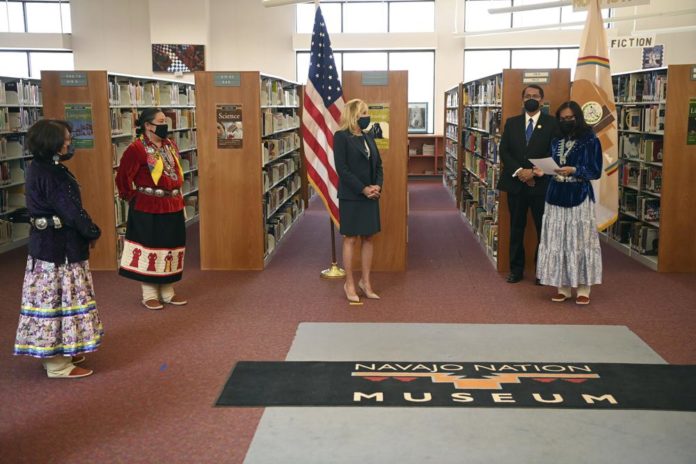
Jill Biden spent the first day of a two-day trip to the Navajo Nation on Thursday hearing from female leaders about the needs and priorities of the country’s largest Native American reservation, including more law enforcement and medical resources.
The trip was Biden’s third to the sprawling reservation — which extends into Arizona, New Mexico, and a corner of Utah — and her first as first lady.
Navajo Nation First Lady Phefelia Nez thanked her for supporting a cancer treatment center in Tuba City, on the reservation’s western side, but noted it has received more patients than expected and needs to be expanded. Biden’s last visit, in 2019, celebrated the center’s opening.
“That sort of breaks my heart, having so many of my own family members who have been victims of cancer,” Biden responded.
Dottie Lizer, wife of Navajo Nation Vice President Myron Lizer, listed a range of issues she and Nez have been working on, including education and financial literacy, and efforts to protect Navajo children and families, cultural teachings, and the tribe’s language.
She and Nez were among a group of women who met with Biden at the library of the Navajo Nation museum in the tribal capital of Window Rock. The women wore traditional crushed velvet or ribbon skirts, moccasins, and jewelry made of silver and turquoise, one of four stones sacred to the tribe. Some wore their hair in traditional buns.
Others spoke about violence against women and said more resources are needed for victims. Outside, some residents who lined the streets along Biden’s route to the tribal government center held photos of Indigenous women who have disappeared or been killed.
Dottie Lizer thanked the first lady for listening and she said she was appreciative of someone “who shares of the values of faith, harmony, and compassion with all of us.”
On Friday, Biden will visit a boarding school and a nearby hospital that has been administering vaccines, both of which the tribe runs under contract with the federal government.
The trip comes as the tribe reports no COVID-related deaths for the 11th time in the past 12 days. It’s also reporting far fewer daily cases than early on in the pandemic when the reservation had one of the country’s highest per-capita infection rates.
The tribe has approached reopening more cautiously than surrounding states, most recently because of coronavirus variants identified among infections. On Monday, it plans to reopen tribal parks to residents and increase capacity for businesses, gatherings, and tribal casinos to 50%.
About half the reservation’s population is fully vaccinated roughly twice the U.S. rate. Still, residents on the Navajo Nation must wear masks and travel only for essential activity. Tribal roads are closed to visitors.
“We’re not celebrating yet,” Navajo Nation President Jonathan Nez said during a virtual town hall Wednesday. “The pandemic is still here.”
The Navajo Tribal Utility Authority has chipped away at water, electricity, and broadband needs, partly with funding from the federal Coronavirus Aid, Relief, and Economic Security Act. But it estimates the price tag for providing basic utilities to residents at more than $5 billion. That won’t be met even with money from the latest federal relief package, which set aside $20 billion for tribal governments.
Separately, President Joe Biden has proposed increasing the budget of the chronically underfunded Indian Health Service by $2.2 billion. The agency provides primary care to more than 2 million Native Americans. It has said the funding would help address longstanding inequities among its patients.
“It’s a priority to improve relationships between the federal government and Native American people, but also there’s a lot of need throughout the Navajo Nation,” said Dr. Gregory Jarrin, a clinical consultant for the agency.
During Jill Biden’s 2019 trip to the reservation, she urged Americans to contribute financially to address health disparities in a region where poverty and unemployment are high.
In 2013, she gave the commencement address at Navajo Technical University in Crownpoint, New Mexico, where she focused her speech on community, saying: “You all have a stake in each other’s future.”
That value is what drove tribes across the country to enact strict measures to prevent the spread of the coronavirus to protect elders and future generations.
The first lady kicked off a three-day visit to the U.S. Southwest with a tour of a vaccination clinic in New Mexico, where early efforts to get people registered for shots helped propel the state’s standing as a national leader in vaccine distribution.
Republished with the permission of the Associated Press.














